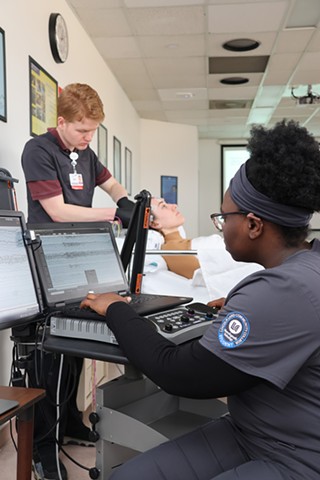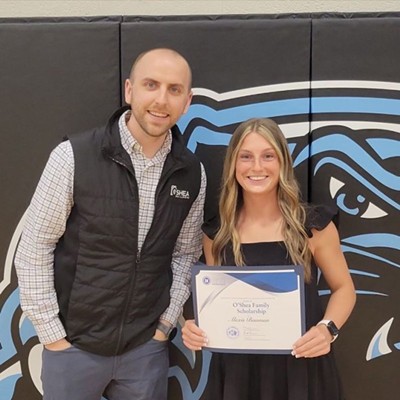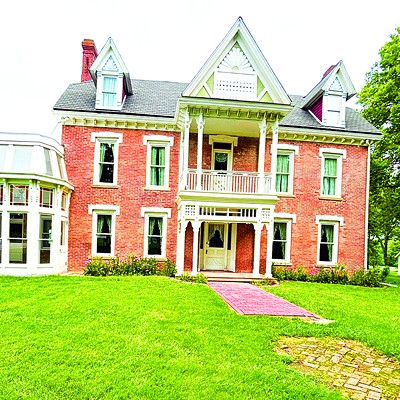Looking to enter the workforce or change careers quickly and affordably? Look no further than your local community college. They offer many workforce and health care training programs, such as welding and nursing, but also lesser-known career paths that lead to well-paying jobs.
Community colleges are in tune with area workforce needs and committed to preparing students for local jobs using the latest technologies. In some programs, qualified students can receive assistance for training costs and even be paid while in school.
Here are some lesser-known careers you can train for in two years or less at Lincoln Land Community College (LLCC) in Springfield.
Industrial technology
Understanding how machines work and how to repair them is the job of the industrial technologist.
"Take what an electrician does and add in mechanical drive systems, pneumatics, hydraulics and process controls, and you have an industrial technologist," said Doug Hoy, industrial technologies program director at LLCC's Workforce Institute. "They can work on and repair not only the electrical but all parts of a machine."
A certificate of completion in industrial technologies takes one year to complete and a certificate of achievement in industrial maintenance technology can be earned in 16 months.
"Job security in this field is great," noted Hoy. "You can work in manufacturing and production facilities, power plants, renewable energy, transportation, health care, railroads, food processing plants, government facilities, high schools and universities ... the list goes on. These positions are a key cog in many operations and are highly valued."
He said starting salaries are approximately $25-$35 an hour but may be much higher where there is a shortage of skilled workers in this field. He says the successful industrial technology student is one with problem-solving abilities, trouble-shooting skills, a keen eye to diagnose mechanical problems and proactive with time-management skills.
"Industrial technology is one of LLCC's programs now incorporating virtual reality to instruct students. We're using zSpace apps that allow students to see inside a motor; instead of tearing a real machine motor apart we can click on it, enlarge it in 3D and see all of the components, move them around and diagnose the problem," said Hoy.
Cardiovascular sonography
This brand-new program at LLCC joins related programs in diagnostic medical sonography and vascular sonography.
"The cardiovascular sonographer looks at the heart and vascular systems, including veins and arteries," said Dr. Cynthia Maskey, dean of health professions. "Students learn to perform and read EKGs (echocardiograms) which assist doctors in diagnosing and treating patients. This two-year, associate degree program is the result of local demand and need for professionals in this field."
Maskey added that this career is rewarding through patient interactions and offers competitive salaries with a median of $89,000 per year. Two specialty areas are covered, adult echocardiography and vascular sonography, through hands-on training and clinical experiences.
Neurodiagnostic technology (NDT)
Have you had a brain scan or sleep apnea test? If so, they were likely performed by a neurodiagnostic technologist. LLCC offers both a 12-month certificate program and a 21-month associate degree program in the field.
"Graduates go straight to work administering and analyzing EEGs (electroencephalograms) or brain wave tests," said Maskey. "They also perform other types of brain diagnostic testing to evaluate someone who has had an injury or seizures. They study and help diagnose abnormalities of the brain and peripheral nervous systems."
She said the career offers good pay and benefits, starting at an average of $52,000 per year. However, with the high demand for these positions, employers often offer signing and retention bonuses. Jobs are available locally and nationally for graduates of LLCC's NDT program, which is the only one of its kind in Illinois.
Surgical technology
"Surgical technologists are an integral part of the operating team," said Maskey. "They assist surgeons and nurses, making sure all equipment is in place, sterile and ready for an operation."
She said there are many jobs open for surgical technologists locally and beyond, and they are well-paid at a median of $78,000 per year. She noted that "surg techs" may start their careers in hospitals and go on to other positions including surgical equipment representatives. LLCC's surgical technology program takes two years to complete.
Grants available
Community colleges like LLCC often receive state and federal grants that help students pay for training and fill workforce needs. For individuals interested in entering or advancing in health care careers, LLCC offers the grant-funded Pipeline for the Advancement of the Healthcare Workforce (PATH) program. PATH participants, depending on their individual circumstances, may qualify for assistance with tuition and fees, books and materials; stipends while they attend class; transportation and childcare assistance; specialized tutoring and job placement; and equipment loans. More information on eligibility can be found at www.llcc.edu/path.
LLCC also received a grant from the Illinois Community College Board to implement virtual reality equipment into career and technical programs to "provide new cutting-edge training opportunities to better position (students) for success in their chosen career fields," said ICCB executive director Brian Durham.
In addition to industrial technology, LLCC is incorporating VR in programs such as sonography and emergency medical services, among others.
"The grant has allowed us to purchase phantoms (medical mannequins that simulate patient conditions and trauma), which are very expensive and very helpful in simulating both normal and abnormal symptoms for students to diagnose," said Maskey.
Lynn Whalen is a freelance writer with a background in broadcast journalism and higher education public relations and marketing, most recently as Chief Communications Officer at Lincoln Land Community College. She also serves as President Emerita of the National Council for Marketing and Public Relations, the nation's premier organization for communications professionals at community colleges.






















